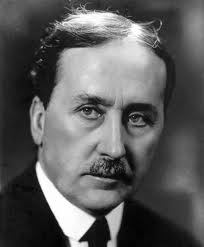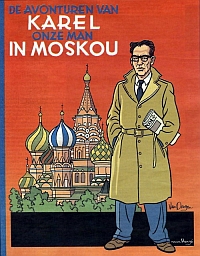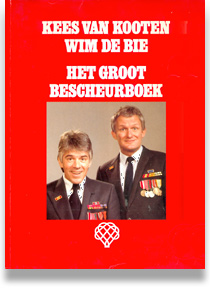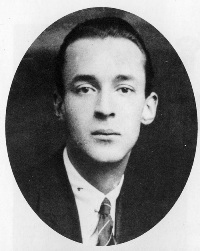Influence on and by the work of Ilf and Petrov
Their predecessors
It has often been stated that Ilf and Petrov wrote in the satirical
tradition of Gogol and Saltykov-Shchedrin. This is true, of course, though it
does not do justice to Gogol, who was much more than a satiricist. (And so,
incidentally, were Ilf and Petrov, see elsewhere on this site.
However, I think few will object that they were satiricists, more so than Gogol.)
If you want to learn more about the issue of influences on the work of
Ilf and Petrov I advise you to read Shcheglov's magnificent
Спутник.
Two influences mentioned by Shcheglov which are less well-known than the
above-mentioned writers are Ehrenburg - in particular his
Julio
Jurenito - and the
Satirikon writers (especially Averchenko and Teffi), who
were unmentionable during Soviet times, because they emigrated after the
Revolution. Ilf and Petrov had certainly read their work and their influence
is beyond doubt.
Their successors
This is another subject for which I would very much appreciate
input by
readers.
Ilf and Petrov wrote in a literary tradition. Which later writers continued
this tradition?
I do not pretend to be an expert on world literature. Therefore I will discuss
some Dutch writers here and appeal to the reader
for input for other languages, including Russian.
Dutch
- Elsschot
- K. van het Reve
- Van Kooten en De Bie
English
- Nabokov
Dutch
 Willem Elsschot (1882-1960) was one of the best Dutch writers of the 20th century.
Some would call him a Flemish writer, but his Dutch was impeccable and hardly,
if at all, recognizable as written by a Belgian. His first novel, Villa des Roses
(1913) is already a completely mature masterpiece.
Willem Elsschot (1882-1960) was one of the best Dutch writers of the 20th century.
Some would call him a Flemish writer, but his Dutch was impeccable and hardly,
if at all, recognizable as written by a Belgian. His first novel, Villa des Roses
(1913) is already a completely mature masterpiece.
One of the things which he shares with Ilf and Petrov is that his prose loses
much in translation. His style is sobre but very tense. It gives one the feeling
of great 'inflammability', to paraphrase Karel van het Reve (see below).
I mention him here because of his novels Lijmen (1924, translated in English
under the title of Soft Soap) and Het been
('The leg', 1938). The novels are told by Laarmans, a kind of alter ego of Elsschot himself.
The other hero is a man called Boorman, who is in various respects similar to
Ostap Bender. He is very intelligent and a bit aloof from society. He
understands human nature very well and uses this ability to make money.
Central in these two novels is a magazine with the comically pretentious
name Algemeen Wereldtijdschrift voor Financien, Handel, Nijverheid, Kunsten
en Wetenschappen, of
which Boorman is the director. He publishes very flattering articles about
companies and then sells large quantities of copies to this company, which
then is supposed to distribute it to its potential customers. The point is that
the companies in their optimism and vanity tend to order far too many copies.
Boorman's activities, like Bender's, are formally legal but border on crookery
and sometimes contain an element of blackmail.
The Laarmans character resembles Vorobyanninov in some respects. He is less
smart than Boorman and makes mistakes. Like Vorobyanninov he is sometimes ordered to keep
silent during meetings and also his name is changed like Vorobyanninov's.
Lijmen ends with a very succesful transaction with a small elevator
factory to which Boorman sells 100,000 copies of the magazine. The factory
is the property of a married couple - the wife, a rather pitiful
character with a sick leg, closes the transaction. When they realize that they
absolutely do not need 100,000 copies, it is of course too late. In
Het been remorse hits Boorman. The mega-transaction has not made him
happy, like Bender's million does not make him happy in The Little Golden Calf,
though for different reasons. Boorman now tries to buy back the copies, but
the wife, driven by a stubborn feeling of honour, does not let him. Only
at the very end he succeeds - the ending is happier than that of The Golden
Calf.
Elsschot was interested
in the Soviet-Union and like many other western intellectuals was optimistic
and moderately positive about the developments in the country.
As far as I know, however, he did not know Ilf and Petrov.
 Drawing by Peter van Dongen
Drawing by Peter van Dongen
Karel van het Reve (1921-1999) is not primarily known as a novelist but as a publicist
writing about diverse subjects, including literature, religion, Darwinism,
Freud and many others. He is famous for his crystal-clear, elegant style, his
erudition, humour and wit.
Son of a active communist, in his young years he firmly believed in the
communist cause, but after the war he lost his 'faith' and became a very
outspoken anti-communist, which he remained for the rest of his life.
He studied Russian and wrote his PhD thesis on the esthetics of Soviet-Russian
marxism. In 1968 he was correspondent
in Moscow for the Dutch newspaper Het Parool. He wrote about dissidents
like Belinkov and Amalrik and supported them. Van het Reve was the person who
first brought Sakharov's
Reflections on Progress, Peaceful Coexistence, and Intellectual Freedom,
to the attention of the public.
In 1957 he was appointed Professor of Slavistics in Leiden. He wrote a very
interesting - if somewhat controversial - history of Russian literature up to
Chekhov. Van het Reve wrote a lot about Russian literature, but his interest was mostly
in the 19th century and in 20th century dissident writers.
There is however a rather curious mention of Ilf and Petrov in his Collected
Works (my translation):
"It is very interesting to observe how readers who like a book get attached to the
translation in which they happened to read it. When I was about sixteen years old,
I read The
Golden Calf by Ilf and Petrov in a Dutch translation by
S. van Praag. It was called Een millionair in Sowjet-Rusland. I got so much
attached to that text that I have never wished to read the Russian original. 'Gravin
loopt krankzinnig van angst in vijver' [Графиня изменившмся лицом бежит пруду - PJ]
is for me the original text [...]" (Van het Reve then proceeds to state that he
understands that this is an inadequate translation.). This truly baffles me. He was Professor in
Slavistics at the time but apparently did not think he simply had to read this
book in Russian. Whereas when writing about English or German literature he
always quoted in the orginal language.
Anyway, he definitely read and admired The Golden Calf. When
after his death
his library was auctioned to raise money for the publication of his Collected
Works, I bought his copy of Как создавался Робинзон.
Besides his essayistic work Van het Reve wrote two novels. The second, Nacht op de kale berg
('Night on the bare mountain', 1961), is the one I want to discuss here. The two
heroes, Joop Flavius and Bram van Heel, form another Bender/Vorobyanninov
pair, though they may rather be inspired by Elsschot's Boorman and Laarmans,
since Van het Reve admired Elsschot very much - this novel contains a few
hidden references to Lijmen.
The plot of the novel has some
striking similarities with The Golden Calf. The two heroes meet a very
nice girl, who is just as attractive and morally stable as Zosya Sinitskaya.
She is taking care of an elderly gentleman, whom 'she would not marry even for
a million guilders'. "Would you marry one of us for a million?" Flavius asks.
Well, she might consider it. They agree to meet again in exactly one year and
the two friends set out to gather a million. Flavius concludes that the best
way to earn a million on such a short term is 'to very urgently ask for it', so
that it will be 'handed on a golden platter'. He organizes a religious sect
(the novel is, among other things, an anti-religious satire), whose believers
are supposed to contribute 10 percent of their income to the building of a
Temple. (Dutch readers who consider reading the novel are advised to skip
the next part, since I will reveal the plot.) After some adventures the friends
really manage to gather a million. However, when they present the money to
the girl, she is flabbergasted and says: "You should not have done that.
I will not accept the money." After a short discussion she walks away.
And then they do what Ostap considered doing as well, but rejected as
'пижонство, гусарство': they burn the money. And then there is a
marvellous, brilliant final twist at the end, which I will not go into here.
To me the similarities are striking, even though Van het Reve was following
in the footsteps of Elsschot rather than Ilf and Petrov.
 Finally I cannot help mentioning Van Kooten en De Bie here. They were
a famous television duo, who presented satirical sketches on television for more
than twenty years. Their satire was not unlike Ilf and Petrov's: sometimes
with ambiguous irony, leaving the reader in doubt what their real view was. And
most importantly, with a great feeling for language. Like Ilf and Petrov they made
a great contribution to their native language, creating words and phrases
which are still used, often without the user being aware of the origin.
Finally I cannot help mentioning Van Kooten en De Bie here. They were
a famous television duo, who presented satirical sketches on television for more
than twenty years. Their satire was not unlike Ilf and Petrov's: sometimes
with ambiguous irony, leaving the reader in doubt what their real view was. And
most importantly, with a great feeling for language. Like Ilf and Petrov they made
a great contribution to their native language, creating words and phrases
which are still used, often without the user being aware of the origin.
Like Ilf and Petrov they were immensely popular, not only with the cultural
elite but also with the 'general public'. And even young people, from after the
television days of Van Kooten en De Bie, generally know their name and have seen
some of their sketches.
They are both writers as well. Some of De Bie's short stories are
very close to Ilf and Petrov's short stories in their tone,
style and subject matter.
And they wrote together as well: between 1972 and 1986 they published a
so-called 'Bescheurkalender' (a pun on scheuren, 'tearing off', and
zich bescheuren, 'laughing out loud', i.e. a humorous block calender)
every year. In 1986 a magnificent anthology
of these calenders appeared: Het Groot Bescheurboek.
I have no information about their having read the work of Ilf and Petrov.
English
 Sergey Gandlevsky suggests a relationship between
Vladimir Nabokov and Ilf and Petrov.
In an interesting
article in the magazine Citata he
first discusses general similarities between the works of Nabokov and those of
Ilf and Petrov and
then more in particular points to Lolita as being in a sense a more
modern, American version of the Bender novels, with Humbert Humbert of course
in the role of Bender, travelling the country and having to deal with its
petty bourgeois inhabitants, just like Bender.
Sergey Gandlevsky suggests a relationship between
Vladimir Nabokov and Ilf and Petrov.
In an interesting
article in the magazine Citata he
first discusses general similarities between the works of Nabokov and those of
Ilf and Petrov and
then more in particular points to Lolita as being in a sense a more
modern, American version of the Bender novels, with Humbert Humbert of course
in the role of Bender, travelling the country and having to deal with its
petty bourgeois inhabitants, just like Bender.
Personally, I think this is a bit far-fetched, although some similarities are
certainly present. However, if Nabokov really had Bender in mind when
creating Humbert Humbert, he would have built-in some obscure allusion or
hint, and such an allusion has not been identified as far a I know.
Nabokov
has alway rejected the idea of Lolita being a satirical novel about
America: "Satire is a lesson, parody is a game," he used to say. He disdained
filologists who approached Gogol only as a satiricist, and I am sure that,
would he have teached about Ilf and Petrov, he would not have treated the
satirical aspect of their novels very extensively. On the other hand, I think
one cannot deny that Lolita does have some satirical elements.
To sum up, I do not think that Nabokov consciously hinted at Bender in his
creation of Humbert Humbert, but I do think there is some relationship to be
seen, and comparing Lolita and the Bender novels is a potentially
useful exercise.
It is also interesting to compare the
travels
of Humbert Humbert and Nabokov in America
with Ilf and Petrov's American roadtrip.
We know that Nabokov admired Ilf and Petrov. See for more information the Citata
article mentioned above.

Document history of this page:
First online - 18/11/2010
Last minor changes - 12/01/2011
Last major changes -